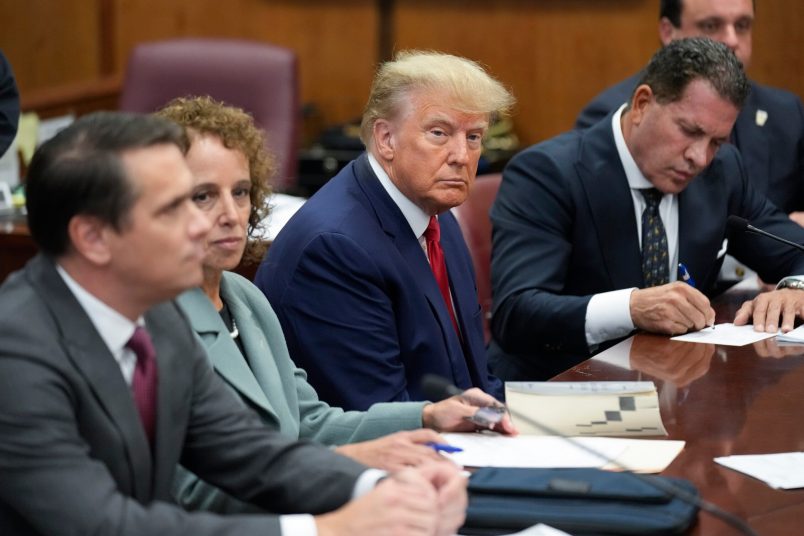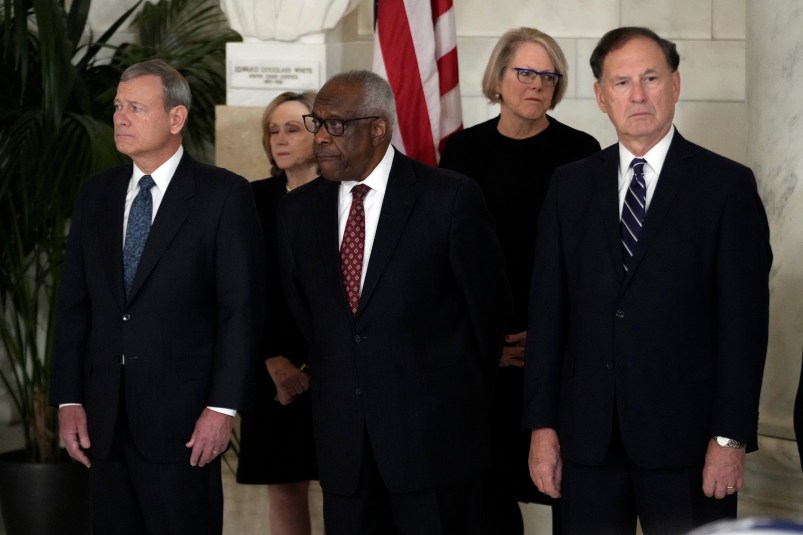We’ve now had the day of spectacle and legal experts have had a chance to provide their first analyses of the case brought against former President Trump. On the substance the case isn’t difficult to understand: In the final weeks of the 2016 campaign, Trump orchestrated a hush money scheme to keep a series of affairs and assignations out of the press and in so doing broke a series of laws. The legal arguments behind the case are more complicated, involving both federal and state laws, and a specific argument about how different violations of the law interact with each other to create a broader pattern of criminal conduct.
On this point fair-minded people (by which I mean people who are knowledgable and by no means carrying water for Trump) appear divided. Those saying the legal foundations of the case are shaky include Rick Hasen (see here) and Ian Millhiser (see here). On the contrary, Ryan Goodman et al. at JustSecurity (see here) say these skeptics are wrong and, broadly, that they’re not focusing squarely enough on the New York case law which controls the prosecution. I’m not in a position to tell you which narrowly legal arguments are better. But I am in a position to argue against the underlying political argument of those who fear that the legal merits of the case aren’t unassailable.
Many who worry that the legal arguments of this case aren’t strong enough argue that if the case gets watered down or thrown out on a legal technicality that that will just confirm the beliefs and add power to the arguments of those who say the legal system is already a sham, biased against conservatives and worse. So in this sense, it’s not just that the case may fail. It’s that its possible failure will empower those already trying to tear down civic democracy, the concept of impartial justice and the rule of law.
That’s flawed reasoning. Prosecutors shouldn’t bring marginal cases or those they don’t believe in in any case — not for ex-presidents and not for street criminals. I hope the legal theory of this prosecution is robust because the underlying offenses are serious and deserve accountability. It’s fundamentally about a conspiracy to undermine the integrity of the 2016 election. (Let’s remember that one of Trump’s accomplices already did jail time for just part of this criminal conduct.) But if they don’t survive judicial scrutiny, that’s the rule of law too. That’s okay. The rule of law is a set of agreed upon processes, not agreed upon outcomes. I don’t buy the argument that the rule of law cannot survive the rule of law working in Trump’s case. That doesn’t make sense.
Some people imagine I’m being a judicial Candide in these arguments: however it works out will be for the best. That’s not right. Everyone needs to make a concerted effort to disengage from the gravitational force of Trump’s drama, which so many are still living within. Trump committed a lot of crimes. Now that he’s out of office the criminal justice process should take its course. The criminal justice system doesn’t have to pitch a no-hitter, let alone a perfect game, to justify itself or survive. That’s very much the world of Trump’s drama. Heads he wins; tails you lose.
This overnight New York Times analysis piece operated in a similar vein, arguing that President Biden risked being overshadowed by Trump as he takes center stage again in the national political drama. As Trump was taken into custody and arraigned on multiple felony indictments, the Times’ Peter Baker and Michael Shear argued, “President Biden faded into the background, ceding the stage to his defendant-predecessor. He seemed content to do so, at least for now.” It seems necessary to remind people, and perhaps ourselves, that getting indicted and arraigned on multiple felony charges which a decisive majority of Americans support is actually not a win. The Times noted that the fact Biden “made no effort to compete for attention with the arrest of a former president … underscored the unique challenge that has confronted Mr. Biden since taking office.” In fact, getting “overshadowed” in this way, as Biden supposedly has, is a good thing, both substantively and politically. The inability to grasp this is part of a broader failure to come to grips with the verdicts of the 2020 and 2022 elections, both of which Republicans lost and lost in large measure because of Donald Trump. There are few better illustrations of the reality distortion field that surrounds this man and which we all must strive to disengage from.
Let me address a final point.
The universal argument from Republicans yesterday was that now everything changes. Going forward every former president will be hounded by politicized indictments after leaving office. It was even argued that such indictments only provide more incentive for presidents to refuse to relinquish power to avoid prosecution. Our national line in the sand is that we won’t tolerate any president attempting to remain in office in defiance of the law rather than trying to provide them incentives to leave office voluntarily. It’s worth remembering that Donald Trump is the first and only president in American history to attempt a coup d’etat to remain in office illegally and that was before any history of presidential prosecutions. The problem isn’t incentives. It’s Donald Trump.
But let’s address the argument head on. Will all future presidents now face a gauntlet of post-presidential judicial scrutiny? It’s worth confronting what this claim means in its raw form. Republicans are saying that even though they know full well, even if they won’t say it, that former President Trump has engaged in extensive criminal conduct, they will find or manufacture (it doesn’t matter which) indictments against future Democratic presidents as a matter of payback. This is a credible threat, if not a likely outcome, because it is an established Republican pattern. It amounts to the same specious argument as the one about limiting incentives for presidential coups: don’t follow the law because we’ll break the law.
It’s quite possible that Republicans will do this. Most frivolous charges won’t survive at trial or will be thrown out of court. That’s no guarantee of course. But there’s also no shortage of people who want to be president, with all it entails. I’ll trust it’s a mix of annoyance and risk they’ll assume as part of the price of serving their country.







